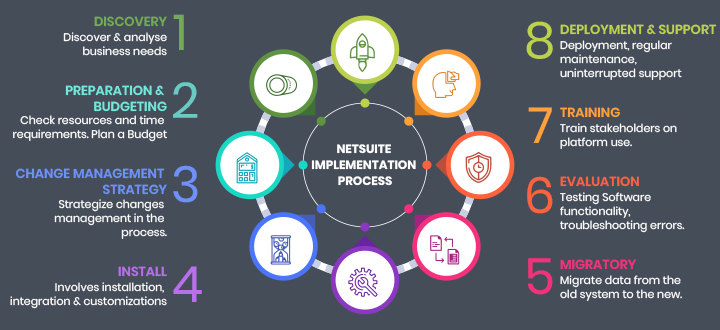

ACL Digital
The Ultimate Guide to NetSuite ERP Implementation
What do you think about NetSuite ERP? What should you know before implementing NetSuite for your business?
NetSuite provides the pre-eminent tools on the market to help you operate your company on a consolidated platform. This cloud-based ERP business management package is tailored to your sector and organization, from sales to accounting.
The implementation approach commonly includes planning, preparation, configuration, data transfer, testing, and training.
A good project manager is essential for Oracle NetSuite success. Any ERP project should have a project leader assigned before it begins. However, it may become a full-time job depending on the company’s growth. Opt for a team leader who can handle projects well.
The Next Big Thing in NetSuite ERP Implementation
When businesses realize that moving their Oracle NetSuite ERP and other modules to the cloud will help them compete in today’s market, the move will likely speed up even more. Those businesses that already use cloud ERP will look for ways to use the cloud even more.
The next few months will also be a good time for businesses to make their ERP softwares work well for people who work from home. More mobile ERP functionality, secure remote access, remote training, and more automated workflows are all part of this.
Watch for another trend: more ERP supply chain management features that can help protect the company from supply chain disruptions or other changes in global economic conditions, as a rise in oil price.
A Beginner's Guide to NetSuite ERP Implementation
When it comes to cloud-based business management software, NetSuite is the world’s best. It helps businesses manage their core business processes with a single, fully integrated system that includes:
- ERP, financials
- CRM (Customer Relationship Management)
- E-commerce and more.
NetSuite software is quick to set up, simple to use, and flexible enough to work with all parts of your business.
Here is a beginner Guide to NetSuite implementation:

1. Discovery
The discovery phase of any NetSuite ERP deployment is crucial because it helps you understand and record the “why” behind your new system and develop a precise implementation specification.
The NetSuite discovery phase includes recording and analyzing user and business needs.
If you’re considering deploying NetSuite ERP software, make sure your strategy covers the resources needed, the timing, and changes.
2. Preparation & Budgeting
Budgeting is a vital aspect of any ERP softwares and system. You can’t have it all, so you’ll have to make some hard decisions. It’s simple to over-plan for your NetSuite deployment, but it’s equally possible to under-plan. Your objective should be to design a budget that includes a reasonable contingency.
3. Change management strategy
Change management strategies are often neglected or under planned in big ERP implementations. Hence, proper NetSuite Consulting is mandatory,
A change management strategy can help you manage change during the installation of your new system. It saves you time and money by defining the expected outcomes and expenses. It should cover the where, when, why, and how the implementation process and communication routes progress.
4. Install
Installing and configuring the system begins the implementation step of putting the discoveries from discovery into action. This step ensures that NetSuite software is installed correctly, along with any custom integrations or customizations required by your company.
5. Migratory
Migration from traditional ERP systems or multiple systems to Oracle NetSuite can be challenging based on the quality and required data.
Prior to moving data from one source to another, check for errors and duplicates. The migration team will next import the cleaned data and setup it appropriately in NetSuite.
6. Evaluation
During the NetSuite software installation, developers will test individual components for defects and unusual behaviour. In Contrast, it will let them swiftly troubleshoot any unexpected issues.
Along with technical testing, end-users must evaluate the product before it goes live. It’s called UAT.
During UAT, real-time users test the software to validate business processes and ensure it satisfies their needs. Nevertheless, this is also a great time to teach users about the system and utilize it to achieve their goals.
7. Training
Before adopting NetSuite, all stakeholders and users must be properly trained. This training should give everyone a basic grasp of the system and how it helps achieve their goals.
Employees may use guided workflows and on-demand assistance widgets to move around the system in real-time.
8. Deployment & Support
After the successful implementation and testing of the system, it is ready for production deployment. Your organization should be informed of the deployment date so everyone is prepared.
All staff must be comfortable using the system before deployment, so start training early.
NetSuite software, like other programmes, needs help after installation and configuration. Along with updates and periodic maintenance, you may want to increase NetSuite’s capability by adding modules or customizations.
But it’s not only the software that needs long-term upkeep; you’ll also need to prepare your employees by providing ongoing training and support.
There is a reason that millions of businesses across the world rely on NetSuite ERP to:
- Manage operations, information, and processes to make them run better.
- With this, you can see and manage your company from one place.
- Scale for business growth.
- Achieve enhanced business planning and productivity.
- Eliminate information siloes and other business inefficiencies.
Wrapping Up!
ERP software is the backbone of today’s commercial sector. Its benefits help a firm become more competitive and versatile. Subsequently, businesses will adapt to customers rather than the other way around.
So now you know what ERP is! Choosing the proper NetSuite Consulting to deploy this system may provide several benefits to your firm.



